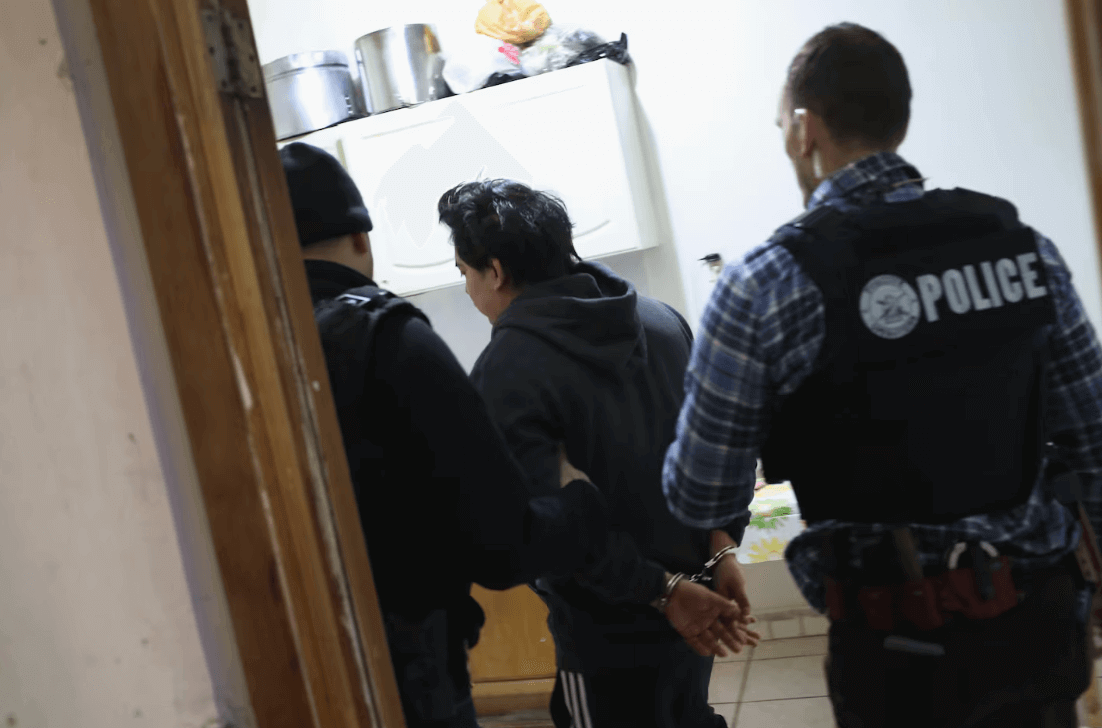唐纳德·特朗普真的能驱逐居住在马萨诸塞州的无证移民吗?

【中美创新时报2024 年 11 月 21 日编译讯】(记者温友平编译)全国 1100 万无证移民中有超过 20 万人居住在马萨诸塞州。当选总统唐纳德·特朗普真的能驱逐他们吗——即使是那些在这里住了多年的人?《波士顿环球报》记者Giulia McDonnell Nieto del Rio 对此作了下述报道。
特朗普将大规模驱逐非法移民作为其竞选的基石,并于周一确认他将宣布国家紧急状态并部署美国军队协助这项工作。特朗普还提议将国民警卫队联邦化,寻求当地执法部门的帮助,针对所谓的“庇护城市”,进行工作场所突袭,并大幅扩大移民拘留范围。
美国的无证移民分为几类,包括未经授权入境的人、签证逾期的人以及违反逗留条件的人。
特朗普及其盟友表示,他们将首先重点驱逐有犯罪前科的无证移民。但他们表示,他们还将针对其他人,例如不被视为公共安全威胁但有有效驱逐令的无证移民,甚至是最近入境的移民。
将成为特朗普“边境沙皇”的汤姆·霍曼 (Tom Homan) 今年夏天在共和党全国大会上表示:“我向乔·拜登在我们国家释放的数百万非法移民传达了一个信息。你们最好现在就开始收拾行李。”
特朗普可能会试图终止拜登政府的人道主义项目,这些项目为移民提供了一些法律保护,以及临时保护身份,该身份在一段时间内保护一些来自海地、萨尔瓦多和委内瑞拉等国的人免于被驱逐出境。这可能会剥夺数万人在这里居住的许可,使他们面临被驱逐出境的风险。倡导者已承诺在法庭上抗争这些举动。
目前尚不清楚特朗普政府能在多大程度上兑现其威胁,特别是在马萨诸塞州这样的民主党据点,该州州长莫拉·希利 (Maura Healey) 誓言保护居民免遭驱逐出境,波士顿市长米歇尔·吴 (Michelle Wu) 表示该市不会配合驱逐出境工作。
不过,一些专家表示,特朗普可能有权发起大规模驱逐出境。
使用国民警卫队协助驱逐出境将提供巨大的人员支持。雪城大学专门研究国家安全和总统权力的法学教授威廉·班克斯表示,虽然国民警卫队各部队向各自的州长汇报,但特朗普可以援引《叛乱法案》在国内部署这些部队。班克斯表示,总统无需州长批准即可援引该法案,尽管此举可能会遭到诉讼。一些专家表示,该法案缺乏有效的保障措施来防止总统越权。
如果特朗普成功将国民警卫队联邦化,他不仅将拥有对马萨诸塞州国民警卫队的权力,还可以将其他州的国民警卫队部队派到这里。
“那将非常极端——但并非不可能,”班克斯说。“《叛乱法案》的性质非常开放,总统可以按照它行事。”
自 1965 年林登·约翰逊总统将阿拉巴马国民警卫队联邦化以保护从塞尔玛游行到蒙哥马利的民权活动人士,并推翻了当时阿拉巴马州州长乔治·华莱士的反对意见以来,没有一位总统在没有州长支持的情况下援引《叛乱法》。
希利表示,马萨诸塞州警察不会帮助执行特朗普的驱逐行动。马萨诸塞州最高司法法院 2017 年的一项裁决裁定,法院官员不能仅凭联邦移民拘留请求就拘留某人。此外,第十修正案限制联邦政府要求各州实施联邦政策。
然而,在某些情况下,马萨诸塞州的治安官会自行与 ICE 达成协议,有时允许他们充当联邦移民局特工,根据合同内容,有权拘留、逮捕和审问移民。截至去年,所有马萨诸塞州治安官都已终止与 ICE 的协议。
扩大驱逐前拘留移民的能力对特朗普的计划至关重要。移民经常被拘留,当局决定是否驱逐他们,或在出庭前根据限制释放他们。
据 NBC 新闻报道,特朗普政府正在寻求扩大美国主要城市附近移民人口众多的拘留设施,并正在考虑恢复拘留父母和子女的做法。政府可以通过与当地执法机构达成新的移民拘留协议来增加拘留移民的能力。
然而,在马萨诸塞州,这类合同遭到一些地方官员和移民倡导者的强烈反对;布里斯托尔和富兰克林县此前曾达成协议,将 ICE 被拘留者关押在县监狱中。但拜登政府于 2021 年终止了与布里斯托尔县的合同,富兰克林县也于当年停止为 ICE 关押被拘留者。
“在没有任何现行法律的情况下,他们不可能让我参与他们的政治议程,”布里斯托尔县警长保罗·赫鲁 (Paul Heroux) 上周在接受采访时表示。
民主党人赫鲁强调,他知道 ICE 有“重要的工作要做”,并且警长办公室确实向 ICE 提供了办公室可以分享的信息——例如囚犯姓名、最后已知地址和监狱释放日期。“我想成为各级政府的好伙伴,”赫鲁说。“但是,安置联邦被拘留者超出了我们的职权范围。”
马萨诸塞州只剩下一个移民拘留中心,即普利茅斯县惩教所,ICE 与普利茅斯县警长办公室签订合同,关押被拘留者。该监狱面临各种虐待和不卫生条件的指控,促使倡导者呼吁将其关闭。普利茅斯县警长 Joseph D. McDonald Jr. 于 9 月与 ICE 续签了一份为期五年的合同。据警长办公室称,截至周三,该设施关押了 368 名联邦移民被拘留者。
私营公司可能会与 ICE 签约,一些私营监狱行业公司,如 GEO Group 和 CoreCivic,表示特朗普的移民议程可能对企业有利。特朗普当选后,这些公司的股价飙升。
不过,这种方法成本高昂,而且特朗普无法“挥动魔杖或下达行政命令”来筹集额外资金进行大规模拘留扩张,哥伦比亚大学法学院移民权利诊所主任 Elora Mukherjee 说。
特朗普肯定会面临无数法律挑战;美国公民自由联盟本周已提起诉讼,要求特朗普提供全面驱逐出境计划的详细信息,其马萨诸塞州分会表示已准备好对任何此类行动作出回应。
“唐纳德·特朗普提出的许多想法都是公然违法的,”马萨诸塞州美国公民自由联盟的执行律师丹尼尔·麦克法登 (Daniel McFadden) 表示,他指出特朗普曾表示将终止出生公民权,并暗示他将向各州施压,要求其协助驱逐出境。
霍曼表示,他将恢复对涉嫌雇用无证工人的工作场所的突击检查。特朗普 2018 年和 2019 年的前 ICE 代理局长罗纳德·维蒂耶洛 (Ronald Vitiello) 表示,工作场所执法行动对于逮捕大量移民至关重要。他们还会对雇主的招聘行为进行处罚。
“恢复这项工作是纠正错误的重要因素,”他说。
2007 年,联邦特工在新贝德福德的一家工厂逮捕了 350 多名无证移民,最终驱逐了约 150 人。被针对的人说,他们每天都要承受那次突袭带来的痛苦。
胡安娜·加西亚 (Juana Garcia) 是来自危地马拉的玛雅土著移民,当时她没有证件。2007 年那天早上,她正在新贝德福德的工厂里做着她平常的工作,缝制皮带和背包,这时大约 300 名 ICE 特工冲进来。她恳求与患有严重哮喘的 2 岁儿子团聚。但加西亚在接受采访时说,她被送到了德克萨斯州的一个拘留中心,在那里呆了大约九天。
“我出门上班,希望当天下午就能回家,”她用西班牙语说。“离开儿子对我来说太痛苦了。”
在她的家人和社区领导人向民选官员上诉后,她被释放;她的儿子病得很重,正在医院里。但加西亚的数十名同事被驱逐出境,其中许多人是孩子被留在家中等待的母亲。
加西亚最终获得了庇护,现在是居住在新贝德福德的美国公民。她说,她和儿子花了好几年的时间才从那段分离时期的创伤中走出来。
“很多父亲、母亲都和我们当时处于同样的境地,”她说。“我不希望任何人经历那样的遭遇。”
题图:美国移民和海关执法局 (ICE) 的警察在布鲁克林布什维克社区的一次突袭中逮捕了一名无证移民,该社区被认为是无证移民的“庇护城市”。John Moore/Getty Images
附原英文报道:
Could Donald Trump really deport undocumented immigrants who live in Mass.?
By Giulia McDonnell Nieto del Rio Globe Staff,Updated November 21, 2024
U.S. Immigration and Customs Enforcement (ICE), officers arrested an undocumented immigrant during a raid in the Bushwick neighborhood of Brooklyn, considered a “sanctuary city” for undocumented immigrants.John Moore/Getty Images
More than 200,000 of the nation’s 11 million undocumented immigrants live in Massachusetts. Could President-elect Donald Trump really deport them — even those who have been here for years?
Trump made mass deportations of immigrants without legal status a cornerstone of his campaign, and on Monday confirmed he would declare a national emergency and deploy the US military to assist in the effort. Trump has also proposed federalizing national guard troops, enlisting the help of local law enforcement, targeting so-called “sanctuary cities,” conducting workplace raids, and greatly expanding immigration detention.
Undocumented immigrants in the US fall into a range of categories, including people who entered the country without authorization, those who overstayed visas, and individuals who violated conditions of their stay.
Trump and his allies said they will first focus on deporting undocumented immigrants with a criminal past. But they’ve suggested they will target others as well, such as undocumented immigrants not deemed public safety threats but who have active deportation orders, or even migrants who have recently entered the country.
“I got a message to the millions of illegal aliens that Joe Biden’s released in our country,” Tom Homan, who will be Trump’s “border czar,” said at the Republican National Convention this summer. “You better start packing now.”
Trump will likely attempt to end humanitarian programs under the Biden administration that confer some legal protections to immigrants, as well as Temporary Protected Status, which shields some from countries including Haiti, El Salvador, and Venezuela from deportation for a period of time. This could strip tens of thousands of people of their permission to live here, putting them at risk of deportation. Advocates have pledged to fight these moves in court.
It’s unclear to what extent the Trump administration would be able to carry through on its threats, particularly in a Democratic stronghold such as Massachusetts, where Governor Maura Healey has vowed to protect residents from deportations, and Boston Mayor Michelle Wu has said the city would not cooperate with deportation efforts.
Still, some experts say Trump could have powers at his command to initiate large numbers of deportations.
Using the National Guard to help with deportations would provide a massive personnel boost. While National Guard units report to their respective governors, Trump could invoke the Insurrection Act to deploy these troops domestically, said William Banks, a law professor at Syracuse University who specializes in national security and presidential authority. The President does not need a governor’s approval to invoke the act, Banks said, though lawsuits against the move would be likely. Some experts say it lacks meaningful safeguards to protect against Presidential overreach.
If Trump were to successfully federalize the national guard, he would not only have authority over the Massachusetts National Guard, but would be able to send National Guard troops from other states here.
“That would be pretty extreme — but it’s not implausible,” Banks said. “The Insurrection Act has such an open texture to it, that presidents can run with it.”
No president has invoked the Insurrection Act without gubernatorial support since President Lyndon Johnson federalized Alabama National Guard troops in 1965 to protect Civil Rights activists marching from Selma to Montgomery, overriding objections from the governor of Alabama at the time, George Wallace.
Healey has said the Massachusetts State Police would not help carry out Trump’s deportation efforts. A 2017 decision by the Massachusetts Supreme Judicial Court ruled court officers cannot hold someone on a federal immigration detainer request alone. Also, the Tenth Amendment restricts the federal government from requiring states to implement federal policies.
In some circumstances, however, Massachusetts sheriffs have on their own entered into agreements with ICE, at times allowing them to act as federal immigration agents with the power to detain, arrest, and interrogate immigrants, depending on contract specifics. All Massachusetts sheriffs have now ended those agreements with ICE as of last year.
Broadening the capacity for detaining immigrants before deportation would be crucial for Trump’s plan. Immigrants are often held in detention as authorities decide whether to deport them, or release them under restrictions pending court appearances.
The Trump administration is looking to expand detention facilities near major US cities with large migrant populations, and is considering bringing back the practice of detaining parents with their children, NBC News reported. The administration could add capacity by entering into new agreements with local law enforcement agencies to detain immigrants.
In Massachusetts, however, these kinds of contracts have faced strong pushback from some local officials and immigration advocates; Bristol and Franklin counties previously had agreements to hold ICE detainees in county jails. But the Biden administration terminated its contract with Bristol County in 2021, and Franklin County stopped holding detainees for ICE that year, too.
“In the absence of any existing law, there’s no way that they can make me participate in their political agenda,” Bristol County Sheriff Paul Heroux said in an interview last week.
Heroux, a Democrat, emphasized he knows that ICE has an “important job to do,” and that the sheriff’s office does give ICE information the office is allowed to share — such as the names of inmates, last known addresses, and jail release dates. “I want to be a good partner to any level of government,” Heroux said. “However, housing federal detainees is beyond the scope of our mandate.”
Massachusetts has only one remaining immigration detention center in the state, the Plymouth County Correctional Facility, where ICE contracts with the Plymouth County Sheriff’s Office to hold detainees. It has faced various allegations of abuse and unsanitary conditions, prompting advocates to call for it to shut down. The Plymouth County Sheriff, Joseph D. McDonald Jr., renewed a five-year contract with ICE in September. The facility held 368 federal immigration detainees as of Wednesday, according to the sheriff’s office.
Private companies might contract with ICE, and some in the private prison industry, such as the GEO Group and CoreCivic, have said Trump’s immigration agenda could be good for business. Following Trump’s election, stocks for these companies soared.
That approach would be expensive though, and Trump can’t tap into additional money for large-scale detention expansion “with the wave of a wand or an executive order,” said Elora Mukherjee, director of Columbia Law School’s Immigrants’ Rights Clinic.
Trump will certainly face myriad legal challenges; the ACLU already filed a lawsuit this week requesting details on Trump’s proposals for sweeping deportations, and its Massachusetts chapter said it is prepared to respond to any efforts here.
“A number of ideas floated by Donald Trump are simply, blatantly illegal,” said Daniel McFadden, a managing attorney for the ACLU of Massachusetts, pointing to Trump’s comments he would end birthright citizenship, and suggestions he would pressure states to aid with deportations.
Homan has said he would bring back raids on work sites suspected of employing undocumented workers. Ronald Vitiello, Trump’s former acting ICE director in 2018 and 2019, said worksite enforcement actions are crucial to apprehending large numbers. They also penalize employers for their hiring practices.
“Bringing that back is an important element in setting things right,” he said.
In 2007, federal agents arrested more than 350 undocumented immigrants at a factory in New Bedford, eventually deporting an estimated 150 people. Those who were targeted say they carry the agony of that raid with them every day.
Juana Garcia, an indigenous Maya immigrant from Guatemala who was undocumented at the time, was at the New Bedford factory that morning in 2007, working her usual shift sewing belts and backpacks, when about 300 ICE agents swept in. She pleaded to be reunited with her 2-year-old son, who had severe asthma. Instead, she was sent to a detention center in Texas for about nine days, Garcia said in an interview.
“I left for work with the expectation to return to my house that afternoon,” she said in Spanish. “That was a terrible pain for me, leaving my son.”
She was released from detention after her family and community leaders appealed to elected officials; her son was gravely ill and in the hospital. But dozens of Garcia’s co-workers were deported, many of them mothers whose children had been left waiting for them at home.
Garcia was eventually granted asylum, and now is a US citizen living in New Bedford. She said it took years for her and her son to work through the trauma of that period of separation.
“There are many fathers, mothers, who in the same situation that we were in back then,” she said. “I don’t wish that [experience] upon anyone.”

